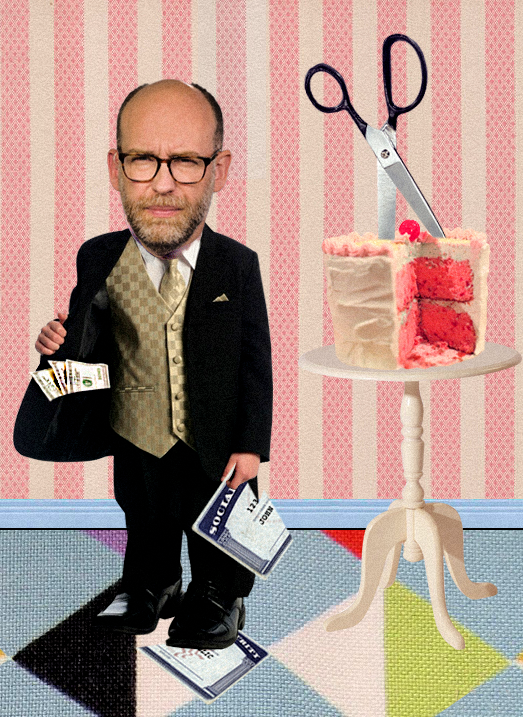More People Will Die Of Cancer Because Of Trump’s & The GOP's Cruel And Unnecessary Austerity Budget
- Howie Klein

- May 22, 2025
- 5 min read
GOP Budget Passes House— Will Slash The Social Safety Net To A Third-World Level

I’m in the final stages of chemotherapy— two more infusions to go— so I spend a couple of days a week at City of Hope, a sprawling Southern California cancer hospital and research center. I talk with a lot of people there, doctors, patients, researchers… Everyone’s worried about Trump’s decision to cut off funding to cancer research. The American public should be too.
According to the National Cancer Institute, approximately 39.3% of Americans will be diagnosed with cancer at some point in their lifetime— roughly 2 out of every 5 people. There are over 2 million new cases annually. Cancer research relies on consistent funding for long-term studies and clinical trials. Trump’s and DOGE’s interruptions are delaying and even canceling trials, affecting patients who depend on experimental treatments, especially for advanced or rare cancers. Trump’s cuts threaten jobs for researchers, support staff, and lab workers, potentially dismantling research infrastructure. Universities like Columbia and the SUNY system reported risks of losing millions, with some labs already shutting down.

There can be no doubt that Trump’s reduced funding will slow advancements in cancer prevention, early detection and therapies, increasing future mortality rates. Rural patients— more likely to be MAGA voters— who already face higher cancer mortality (10% more likely to die than urban patients), will lose access to cutting-edge treatments. Trump and Musk have undermined a system that has made the U.S. a global leader in cancer research. The 34% drop in cancer death rates since 1991 is largely due to NIH-funded advances, and slashing infrastructure support will reverse these gains.
Yesterday, Lexi Cochran reported, flat-out that “The pause of billions of dollars in research funding to universities has had devastating effects on cancer research as lab work is put on hold and schools are halting the acceptance of new Ph.D. students. The Trump administration’s war with higher education, combined with efforts to reduce government spending by DOGE, has left significant casualties in cancer research… Experts fear four years of these sorts of attacks will take decades to recover from and stall the progress of treatments even as cancer rates rise.”
And along with the school-specific funding blocks, cancer research grants have been affected by cuts to the National Institutes of Health (NIH) and other agencies within the Department of Health and Human Services (HHS). An analysis in JAMA on earlier this month found the NIH alone cut almost $1.5 billion in funding in less than 40 days.
Along with a decrease in grants, the NIH is also losing thousands of staffers in a reduction of its workforce.
“We’ve seen institutions like Johns Hopkins and the University of California system already starting to make some cuts to their overall staff,” said Sarah Spreitzer, vice president and chief of staff for government relations at the American Council on Education.
“We’ve also seen institutions pause the acceptance of new Ph.D. or postdoc students because they’re unsure of where the federal funding situation may be this year or even into next year. And given the fact that the presidnet’ budget request has an over 40 percent budget cut to the National Institutes of Health, I think that’s likely going to continue,” Spreitzer added.
I didn’t mean to go off on cancer research per se. It’s just that, at the moment, I’m kind of obsessed. Today I’m spending the day at City of Hope with an occupational therapist who’s helping me to deal with lymphedema, one of the many hideous side effects of chemo. There’s no cure yet, but there is treatment than can make it less horrible to live with. That said, cancer research is hardly the only aspect of American life that Trump, Musk, Russell Vought and their enablers in Congress are ruining. A few hours ago, Thomas Massie (R-KY) and Warren Davidson (R-OH) were the only Republicans to vote againt Trump's "big beautiful bill." Freedom Caucus chair, Andy Harris (R-MD) voted "present" while Andrew Garbarino and David Schweikert hid in the cloakroom. So it passed in the wee hours while most Americans slept, 215-214-1. One hilarious tableau was when Tennessee Republican John Rose, who had boasted just hours earlier that he would vote “no,” changed his vote to “yes” and dashed out of the chamber, weepy, indicating the changes made last night were cruel enough for him to not stop it from moving forward. Before passage, Hakeem Jeffries said “This is one big, ugly bill that House Republicans are trying to jam down the throats of the American people, under the cover of darkness. his legislation will not make life better for the American people. The GOP tax scam represents an assault on the economy, an assault on health care, an assault on nutrition assistance, an assault on tax fairness and an assault on fiscal responsibility.”

Yesterday CNN reported on two of the others— Medicaid and food stamp. Tami Luhby wrote that “House Republicans are pushing to slash nearly $1 trillion from two of the nation’s bedrock safety net programs, Medicaid and food stamps, as part of their sweeping package aimed at enacting President Donald Trump’s agenda. If the legislation is approved, millions of Americans could lose access to these benefits as a result of a historic pullback in federal support. Trump has repeatedly vowed not to touch Medicaid, while GOP lawmakers insist that their proposals would largely affect adults who could— and should, in their view— be employed. But the actual impact would likely hit a far broader range of Americans, including some of the most vulnerable people the GOP has promised repeatedly to protect, experts say. They include children, people with disabilities and senior citizens. A sizeable share of the US population depends on these programs. More than 71 million people are enrolled in Medicaid, and roughly 42 million Americans receive food stamps, according to the federal agencies that oversee them. Hospitals would also feel the financial fallout of the Medicaid cutbacks, which could prompt some to raise their rates for those with job-based insurance and others to close their doors. States would have to shoulder more of the costs of operating these programs, which could force them to make some tough decisions. Among their options could be slashing enrollment, benefits and provider rates in Medicaid or pulling back on residents’ access to food stamps. They might also shift spending from other state-supported programs such as education and infrastructure or hike taxes.”
In addition, grocery store owners are warning that cuts to the Supplemental Nutrition Assistance Program, or SNAP, as food stamps are formally known, could harm local economies and cost jobs.
“We’ve never in history experienced coverage cuts of this size, and that makes it really difficult to predict how states, providers and patients will respond,” said Alice Burns, an associate director of Program on Medicaid and the Uninsured at KFF, a nonpartisan health policy think tank. “For the past 50 years, there have been these incremental increases in the availability and access to health care and health insurance coverage. So moving backwards and taking coverage away … This isn’t something we’ve seen before.”






Comments